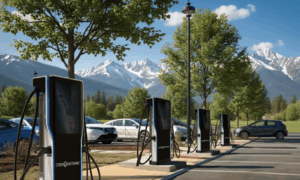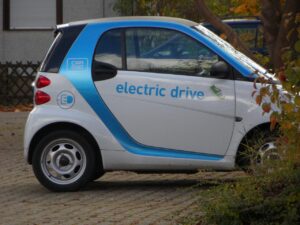
Home / EV Charging News / Essential Information About Solar Electric Car Charging
As the world moves towards renewable energy solutions, the combination of solar power and electric vehicles (EVs) offers a sustainable and efficient way to drive. Solar electric car charging is an innovative approach that leverages the power of the sun to keep EVs running while reducing reliance on traditional energy sources. This article explores the key aspects of using solar energy to charge electric cars, the benefits, and what you need to know to get started.
Solar car charging involves using photovoltaic (PV) panels to convert sunlight into electricity, which can then be used to power your electric vehicle. The process begins with the installation of PV panels on your property, typically on the roof or a dedicated solar array. These panels capture sunlight and convert it into direct current (DC) electricity. An inverter then changes this DC electricity into alternating current (AC), which is compatible with most home electrical systems and EV chargers. In some setups, a battery storage system is used to store excess solar energy generated during the day for use when sunlight is not available, such as at night or on cloudy days. Finally, the converted AC electricity is used to power your EV through a standard charging unit.
Using solar energy to power your EV offers numerous advantages. By generating your own electricity, you can significantly reduce or even eliminate your fuel costs. Over time, the savings on energy bills can offset the initial investment in solar panels and equipment. Solar energy is a clean, renewable resource that reduces your carbon footprint, decreasing greenhouse gas emissions and reliance on fossil fuels. Producing your own electricity gives you greater control over your energy needs and reduces dependence on the grid, especially beneficial during power outages or in areas with unreliable electricity supply. Additionally, installing solar panels can increase the value of your property, as homes with renewable energy systems are often more attractive to buyers looking for sustainable living options.
Before setting up a solar charging system for your EV, there are several factors to consider. The upfront cost of installing solar panels, inverters, and potentially a battery storage system can be substantial. However, various incentives, rebates, and financing options are available to help reduce these costs. The size of your solar system should be based on your energy consumption and the amount of sunlight your location receives. A professional assessment can help determine the optimal system size and placement for maximum efficiency. Ensure that your solar system is compatible with your EV charging setup. Most home systems are designed to work with Level 2 chargers, which are faster and more efficient than standard Level 1 options. While solar panels require minimal maintenance, it’s important to keep them clean and free of debris to ensure they operate at peak efficiency. Regular inspections can help identify and address any issues promptly.
Evaluating your energy needs is the first step, assessing your household’s energy consumption and your EV’s charging requirements. This will help determine the size and capacity of the solar system you need. Consulting with professionals is crucial, as a certified solar installer can design and install a system that meets your needs, providing expert advice on panel placement, system sizing, and potential cost savings. Once the design is finalized, the installation process can begin, including mounting the panels, connecting the inverter, and integrating the system with your home’s electrical setup. After installation, setting up the charging station involves installing an EV charging unit that is compatible with your solar system, with Level 2 chargers recommended for their efficiency and speed. Monitoring and maintaining the system ensures it’s generating enough power to meet your needs, with regular maintenance helping to keep everything running smoothly.
The combination of solar power and electric vehicles is poised to become even more efficient and accessible with future advancements. Smart charging solutions optimize when and how your EV charges, taking advantage of peak solar generation times and minimizing costs. Future systems may allow for better integration with smart grids, enabling bi-directional energy flow where your EV can supply power back to the grid during high-demand periods. Advances in battery storage technology will improve the efficiency and capacity of home energy storage systems, making solar EV charging more reliable.
Solar electric car charging is an eco-friendly and cost-effective way to power your EV. By harnessing the power of the sun, you can reduce your energy bills, lower your carbon footprint, and gain greater energy independence. With the right setup and professional guidance, you can enjoy the many benefits of integrating solar power into your EV charging routine. As technology continues to evolve, the future of solar EV charging looks brighter than ever.



